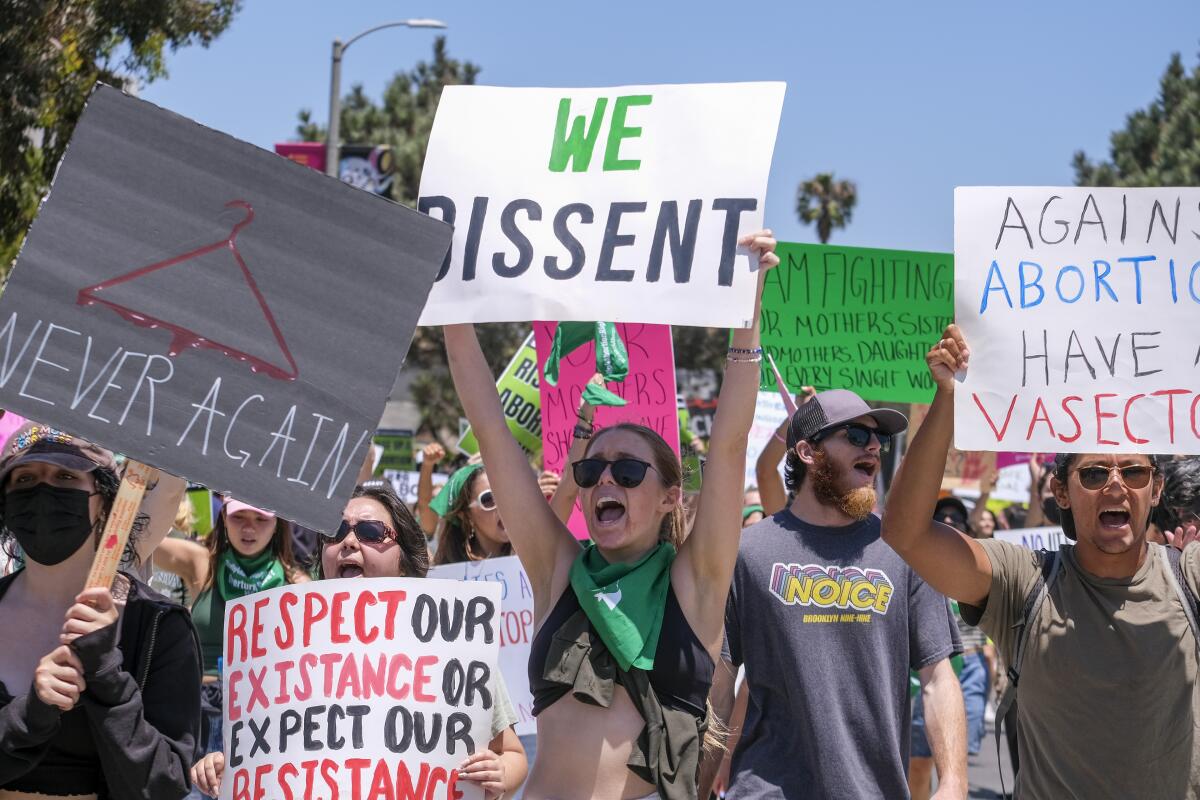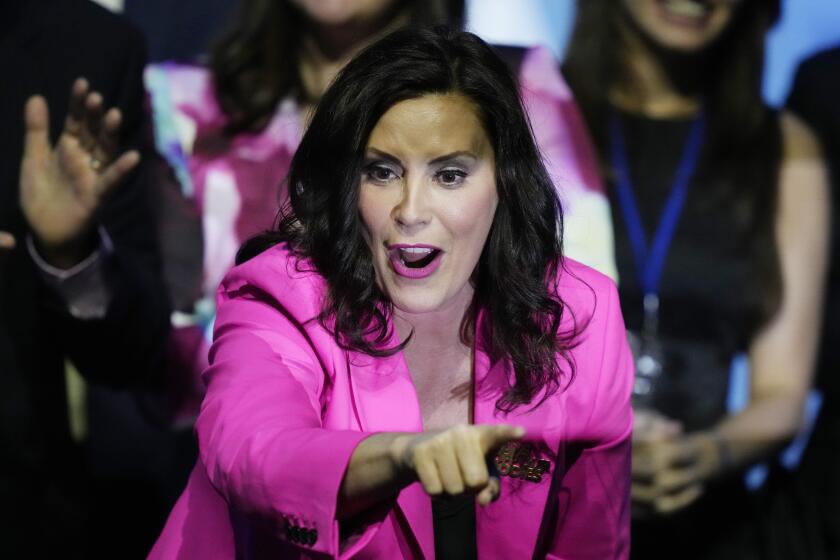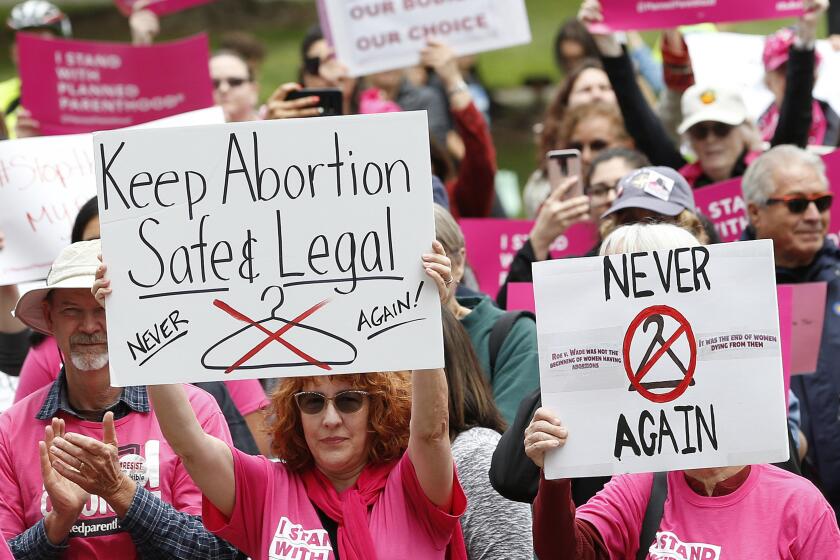Tapping into ‘a simmering rage’: Democrats’ emphasis on abortion stopped GOP gains

This summer, in the weeks after the U.S. Supreme Court overturned Roe vs. Wade, more than three-quarters of a million residents of Michigan signed petitions to put a measure on the ballot to add abortion rights to the state constitution.
In the two months before election day, thousands of volunteers made phone calls and knocked on doors more than 1 million times and talked with more than 100,000 voters, according to organizers. And on Tuesday, Michiganders stood in the cold for hours to vote, including at the University of Michigan, where so many waited in line that the final ballots were not cast until roughly 2 a.m.
When all those ballots were counted, the abortion amendment passed with 57% of the vote — one of four such measures that passed on Tuesday, including one in California. The fate of a fifth measure, in Montana, remains undecided.
In Michigan, the impact cascaded down the ballot. Democratic Gov. Gretchen Whitmer, who made abortion rights a major focus of her campaign, handily won reelection, and for the first time since Ronald Reagan was president, Democrats appear to have won control of both houses of the Michigan Legislature.
“Values drove our voters to make decisions that were best for their families — not only our proposition but all down the ballot,” said Julie Rowe, the political and organizing director for the ballot measure campaign, Reproductive Freedom For All.
The 2022 midterm elections were widely forecast to be a wipeout for Democrats. Midterm contests are almost always a referendum on the party in the White House, and that typically results in the president’s side losing significant ground. With the percentage of voters who approve of President Biden’s job performance stuck in the low 40s, historical patterns predicted large Republican gains.

That didn’t happen. Significant numbers of voters who disapprove of Biden voted for Democratic candidates anyway, according to exit polls. And Republicans seem on track to pick up only about a dozen seats in the House, perhaps fewer, while Democrats may retain control of the Senate.
The politics of abortion played a key role in that outcome, according to advocates, Democratic strategists and some rueful Republicans.
Former President Trump’s dominant role may have cost the Republican Party in the midterm elections, but he’s unlikely to walk away quietly.
“Abortion was central to Democratic performance,” said Anna Greenberg, a leading Democratic pollster and strategist, whose clients this year included Sen. Mark Kelly of Arizona, who is leading his race for reelection against Republican Blake Masters, and Sen. Michael Bennet of Colorado, who easily won reelection despite claims by Republicans that he could be vulnerable.
After the Supreme Court’s decision in the abortion case Dobbs vs. Jackson Women’s Health Organization, “we saw increased self-report of interest in the election among Democrats. When we asked if the Dobbs decision made people more likely to vote, a majority said yes, and it grew over the course of the election cycle,” Greenberg said.
The issue “also expanded the gender gap among independent voters,” she added. “Independent women shifted very Democratic in all my races.”
In many of the states where Democrats made gains, those independent voters appear to have been key to the outcome. Typically, when a midterm election goes badly for the party in the White House, one key reason is a shift against them by independents. This year, by contrast, exit polls indicate that Democrats succeeded in splitting the independent vote roughly evenly with Republicans nationwide and won independents in some key states.
Republicans argued that voters would put more priority on economic issues than on reproductive choice. Some Democrats shared that view and told reporters during the fall campaign that they feared their party’s emphasis on abortion would not be an effective counter to Republican arguments about the cost of living.
Advocates were “bracing ourselves for any backlash this cycle from folks that would want to remind us that abortion is a third rail you don’t touch in politics. They were ready to blame the abortion framing on any losses we might have had,” said Tory Gavito, president of Way to Win, a progressive donor network.
“That thinking can go firmly in the grave” now, she said.
The framing of abortion rights versus the economy ignores how many voters think about economic uncertainty, said Heidi Sieck, co-founder of #VOTEPROCHOICE, a political advocacy group that tracks and advocates for state and local candidates who support abortion access.
Get our L.A. Times Politics newsletter
The latest news, analysis and insights from our politics team.
You may occasionally receive promotional content from the Los Angeles Times.
“There is no difference between reproductive freedom and the economy,” Sieck said. “If you cannot control how many children you have, you cannot control the bills that you have to pay. They’re the same ... thing.”
Focusing on the issue allowed Democratic candidates to tap into a “simmering rage that did not stop,” said Melissa Hortman, the speaker of the Minnesota House of Representatives. Democrats in that state gained control of both houses of the Legislature and the governorship on Tuesday, a result that Hortman credited to a focus on reproductive rights.
“That is where everything starts,” Hortman told reporters. “If you don’t have freedom over your own body, none of the rest of it matters.”
Despite doubts by some in the party, Democrats spent heavily on advertising to emphasize the abortion issue in key states, and prominent party leaders, like Vice President Kamala Harris, made it a major focus of their time.
Since August, Harris has held 20 events with candidates that focused on abortion, according to her staff. She also hosted officials from 38 states in sessions involving attacks on reproductive rights.
In California, although abortion rights are already heavily protected, Democrats also focused heavily on the issue. Gov. Gavin Newsom held his reelection victory speech Tuesday night at the downtown Sacramento headquarters of the campaign for Proposition 1, which added abortion protections to the California Constitution.
As the vote count showed the proposition passing overwhelmingly — it’s receiving about two-thirds of the vote in returns so far — bottles of champagne were poured to celebrate and an oversized postcard-like banner read, “Welcome to California, where abortion is safe and still legal.”
Voters weigh in on Proposition 1, the statewide ballot measure that would add a right to abortion to the California Constitution.
Newsom thanked California voters for “unambiguous” support for the measure, which he said was a necessary effort to “go on the offense” after the Supreme Court reversal.
With the measure’s passage Tuesday, the state’s Constitution will expressly guarantee a person’s “fundamental right to choose to have an abortion and their fundamental right to choose or refuse contraceptives.”
Opponents predicted that Proposition 1 would lead to large numbers of lawsuits and that the measure’s broad language would override California’s laws limiting late-term abortions and allow the procedure up until birth for any reason. Constitutional law experts dismissed those concerns, saying state laws regarding when abortions can be performed will remain in effect.
California Atty. Gen. Rob Bonta said last month that he’s prepared to fight any lawsuit challenging Proposition 1.
“We’ll defend it in court, and we will allow a court to do its constitutional role to interpret and define and clarify so that it’s clear, but it’s our job to defend the laws of the state of California,” said Bonta, who appeared poised to win in Tuesday’s election against Republican defense attorney Nathan Hochman.
Times staff writers Mark Z. Barabak, Noah Bierman, Melody Gutierrez and Melanie Mason contributed to this report.
More to Read
Get the L.A. Times Politics newsletter
Deeply reported insights into legislation, politics and policy from Sacramento, Washington and beyond. In your inbox three times per week.
You may occasionally receive promotional content from the Los Angeles Times.











